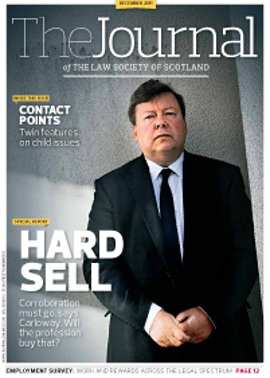Steering with one hand

As reported in last month’s Journal, I spoke at the In-house Lawyers Group annual conference. The theme “Risk & Compliance” had a real resonance for me over the modern role of the employment lawyer.
That role has become much more about assessing and managing risk than when I started out in the 1990s. At that time, the role was more about “firefighting” when a claim had arisen and the employer was looking for a solicitor to defend them.
Nowadays, we talk about the “well-rounded” employment lawyer: that is, someone well versed in the legislation; who can advise clients on the range of options open to them; who can draft contracts and procedures to ensure that a business is compliant; to support commercial colleagues and in-house lawyers on the people aspects of a commercial transaction (including TUPE and due diligence); and, of course, someone with the experience to represent clients at tribunal.
Increasingly, such lawyers are called on by commercial and public sector clients to partner with the HR team to brainstorm the range of options open to the business and then commit to a recommended course of action.
I once heard a client say he was looking for a “one-handed employment lawyer”. In other words, he didn’t want a lawyer who constantly says “on the one hand... but on the other hand”. In-house counsel and HR teams deserve their external solicitors taking a view and giving a recommended course of action, and in-house lawyers are expected in turn to take this approach. Sitting on the fence is not good enough.
In my view, the well-rounded employment lawyer cannot advise on legal risks in a vacuum. Increasingly, the associated risks of public scrutiny, reputational damage, media attention and even employee morale have a greater impact on the risk profile of a particular course of action. It is not uncommon for an organisation to engage an external PR expert to work on the corporate communication strategy when handling a high- profile employment law dispute.
Employment law risks have moved up the corporate agenda. Deals can stand or fall on the people risks (pension liabilities in particular). HR professionals and in-house employment lawyers are increasingly involved in boardroom discussions on corporate strategy. People are integral to this, and the risks have never been higher.
The business partnering approach is all about assessing and managing risk. And mutual trust between client and adviser. In all manner of instructions, I will regularly frame my advice as a “legal risk assessment”, setting out the background and then outlining the options open to the business. Most importantly, having assessed the risks that attach to each of the various options, it falls to us to make a clear recommendation for the preferred way forward.
A client’s approach (or aversion) to risk will inform the preferred strategy for the way forward. The most successful client relationships are those based on trust where both client and adviser are aligned on the client’s approach to risk. Building that relationship gives us, as external legal advisers, the confidence to know that one hand is indeed enough!
Identifying the risks
Employment tribunal claims are on the rise. Official figures showed a 44% increase in tribunal claims accepted in the two years to 2010.
The sheer volume of new law makes it increasingly difficult for businesses (particularly small companies) to keep abreast of developments. Claimants nowadays are much better aware of their legal rights, and it is far easier them to become so.
Like any life event, change can often give rise to the greatest risk exposure to an employer. Employees are naturally unsettled by change and react in different ways, perhaps through fighting a grievance or tribunal claim when things do not go their way, or simply moving on to pastures new.
During the recent recession, we saw employers taking all manner of costs out of businesses through change management projects, reorganisations and collective redundancy exercises. Handled properly, the risk could be readily managed. However, many employers came unstuck by taking a kneejerk reaction which simply increased the risk of costly claims.
When faced with an employment claim, we encourage clients to assess the risks at an early stage. This process is invaluable to set the preferred strategy for defending or alternatively attempting to settle a claim. While the full facts will never be known at the outset, the employer deserves a view from its legal adviser on the likely prospects of success and, importantly, the likely costs of defending the claim should it proceed to tribunal.
Consideration may be given to settlement where the prospects of success are low. The initial legal risk assessment will be key at this stage. Alternatively, the view might be taken that the claim is of low value such that it is not commercially sensible to defend it.
Aside from the merits and value of the claim, other factors to consider include:
- the risk of a reinstatement/re-engagement order;
- the risk of setting adverse precedents – we have all heard the saying “test cases make bad decisions”;
- the exposure to legal costs;
- the drain on management time and availability of witnesses;
- the competence of the management witnesses, who may be inexperienced or uncomfortable giving evidence;
- the risk of adverse publicity;
- the risk of industrial unrest.
Risk management
The earlier the legal adviser can be involved, the more likely that value can be added to bolster the prospects of defending or even preventing a claim. This makes it important for managers to be trained on internal policies and procedures so they have the capability to take decisions fairly and properly.
In the last few years, we have also seen a huge increase in the use of mediation as an alternative to litigation to resolve workplace disputes. Mediation lends itself particularly well to workplace disputes. Invariably, we hear parties speak of “points of principle” when issues arise at work. Relationships are important.
In the last few years, we have seen a huge increase in the use of mediation as an alternative to litigation to resolve disputes in the workplace. Mediation lends itself particularly well to workplace disputes (see panel). Invariably, we hear parties speak of “points of principle” when issues arise at work, and relationships are important in the workplace.
Government initiatives
For some time, the coalition Government has mooted proposals to relax the burden on employers (particularly SMEs) of increased regulation and employment law. It recently confirmed that two key proposals will be implemented.
First, the qualifying period for unfair dismissal claims will be increased from one to two years with effect from 6 April 2012. Secondly, the Government has confirmed that from 2013, individuals will be required to pay a fee for lodging claims. We await clear details of the fee structure that will be implemented, but it has been reported that, in addition to an upfront payment of £250 as a lodging fee, claimants may also have to pay a deposit of £1,000 when a hearing for their case is listed.
Only time will tell whether these proposals will have the desired effect on business confidence, recruitment and ultimately the economy. In the meantime, they do go some way towards limiting the risk exposure to employers in the employment law context.
Managing risk: mediation
Mediation has a number of advantages over litigation in the employment context, including:
- a success rate of about 70-80%, on available figures
- speed, as it can be set up at short notice and generally takes no more than one full day
- cost savings in relation to legal spend and management time
- flexibility, in relation to control of the process and availability of settlement options
- ability to maintain working relationships
- informality
- confidentiality of the process, and the fact that it takes place within a “without prejudice” bubble.
In this issue
- Involving the named person
- Private investigators - mitigating the risks
- Human inventions
- Smoother passage
- Rough law of the street
- Council profile
- Opinion
- Book reviews
- President's column
- Mapping in the Land Register
- Alien concept
- Size does matter
- Case proved?
- Reading for pleasure
- Relocation revisited
- Where Parliament fears to tread...
- Cadder's growing family
- Landlord splits
- Five-year-old experts
- Common sense to the fore
- Beware: earn-outs
- Steering with one hand
- Scottish Solicitors' Discipline Tribunal
- Missives in motion
- Constitution on track
- From the Brussels office
- Law reform update
- Ask Ash
- Outside the box






